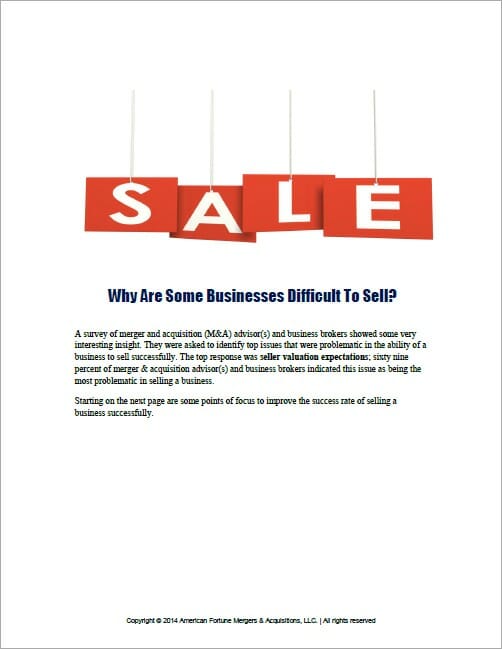
Business Broker Services for Successfully Selling a Business
Business owners turn to a business broker services because of their extensive services for selling businesses. Unlike working with a mutual broker, or dealing with the buyer’s advisors, hiring a business broker means having someone on your side. You’re paying for the business broker services to help you, and they’re working for you to have the best possible outcome of the sale. It is essential to know what services your business brokerage firm can and/or should provide to make your business sale a success.
Not all business brokerage firms provide the same services. When looking for the right firm, you should look for an option that offers valuations, due diligence, marketing, buyer vetting, and more. As a seller, you have a lot more power than what mutual business brokers or a potential buyer’s advisors will let on. With the right broker services, you can manage the business’s sale and experience a well-structured deal and painless exit.
Top Business Broker Services
business Brokers should do everything from conducting a proper evaluation to coordinating the transfer of the company and everything in-between. Nearly every relationship with a business broker should include a company’s full valuation and establish that the business value is defensible. Ultimately, all of the broker services should work together to progress a seller through the process of selling a business with as few complications or obstacles as possible.
Valuation Services
Through proper business valuation, a broker or advisor should deliver a defensible price point for the company and support for that determination. Business brokers can help provide business valuation services and may use several techniques to determine the value.
A business valuation will initially rely on objective analysis. Valuation experts look at quantifiable data, including profits, EBIDTA, and market value of the company’s physical assets. Then valuation service experts will size up the market value and present a roundabout figure toward the company’s valuation. This step largely depends on the company’s financial position as it appears in crucial proprietary documents.
After looking at the financial factors driving the company value, the broker will give fair consideration to other elements. Customer concentration, product concentration, and projections for growth and risk are a few factors that can impact the subjective analysis of a business valuation.
The subjective analysis examines elements that are often overlooked. However, even the subjective analysis will evaluate market forces and apply that toward how the business is run, management teams, staff, and other factors that may present a risk. A subjective analysis can include negative subjective drivers that could lower the valuation of the business. The ones mentioned here are only a few of the many negative factors that could appear in a valuation.
Having a defensible business valuation gives the sellers a good argument against many tactics that buyers use to make unreasonably low offers. Buyers will often try to justify a lower price for the business, but a full-scope valuation considers the book value, and much more than the buyer would gain from the sale. It gives the seller confidence in the asking price, and this well-structured reasoning is the foundation for a smooth sell.
Perform Due Diligence
Due diligence ensures that you’re meeting all necessary legal requirements, and broker broker services help the seller through this process. Collecting key documents such as:
- Financial statements and information
- Standard Operating Procedures and Manuals
- HR policies
- Quality control procedures (if applicable)
- Organizational structure
- Additional operation information
Having these documents together ensures that the deal addresses all elements of this company and how it conducts business. This process is a large portion of a Business Review, which allows the company to properly prepare to change hands.
Provide a Marketable Review of the Company to Attract Buyers
An Offering Memorandum is a document that begins the marketing of the company. It should cover the details of the potential investment to help buyers consider the deal before making a bid. It typically has a structure similar to a business plan, but it provides much more detailed insight into the business’s operations and the potential risks of the purchase. Usually, the Offering Memorandum is 10 to 15 pages long.
Offering Memorandums should lay out:
- Objectives of the company
- Potential risks
- Financial information
- SWOT analysis
- Industry summary
These documents will usually provide enough information for potential buyers to determine whether or not they’re interested in the investment. Ultimately, these documents exist to attract buyers and defend the owner’s interests during the sale.
Active Searching for Potential Buyers
Some business brokers use propriety systems to conduct searches for potential buyers. Others use a variety of means to contract and initiate discussions with potential buyers that would be a good match for the business and the seller.
Some of this searching is done through marketing means, which we’ll touch on in a moment. Outside of marketing, brokers may rely on their business network as well as their site to connect with buyers on the market.
Understanding how your business broker searches for buyers is important. You want to know that the broker is seeking out buyers that fit your expectations. They should use systems that will help them easily identify which buyers can commit to the deal, funding, and qualifications to thrive within the industry.
Marketing Toward Your Ideal Buyers
Listing a business on the broker’s website is often the first step, but it shouldn’t the last. Marketing a business for sale is a sensitive matter because brokers must attract buyers while maintaining confidentiality. To do this, business broker services will usually list the company with a third-party. Additionally, a broker may turn to members-only websites that specialize in listing businesses for sale services.
Business sale brokers should create a buyer target list with a range of 100 to 1,000 companies. They may use unique marketing techniques to accomplish this. As part of marketing, brokers may turn toward industry-specific magazines and trade magazines. The more unique and comprehensive marketing techniques used will increase the chances of selling the business.
Buyer Screening
One of the essential services that business broker services provide is buyer screening. Brokers know that not everyone interested in the business is a good match. A buyer should have ready access to necessary funding and the ability to run the business successfully. To see if a potential buyer meets the qualifications that the seller is looking for, they screen for financing availability, ownership history, buyer financial statements, and similar criteria.
Through buyer screening, the business broker and the owner can save tremendous amounts of time. Of course, the goal is to know who’s taking ownership of the company and protecting the legacy of the business.
Negotiations and Deal Structuring
During negotiations, a broker will represent the seller’s best interest. That’s the appeal of seller-oriented broker services. They will also offer deal structuring advice. Through the broker’s experience in mergers and acquisitions and working in business sales, they know the current trends in deals and what you should aim to achieve through the sale.
While offering deal structuring advice, brokers can provide insight into handling tax reduction during this phase. As part of the structuring, sellers have unique options with handling their taxes, and often business owners aren’t aware of those possibilities.
As part of negotiations and deal structuring, brokers should actively work to ensure that buyers and their advisors don’t take advantage of the seller.
Coordination and Protection of the Business Sale
Because of the close handling of the sale from start to finish, business sale brokers can adequately prepare the seller and the business for the sale. They will coordinate the business sale transaction to ensure that it goes smoothly and walk the seller through the process. Most business owners don’t sell company’s often, and having a guide through the process can add confidence in the legal handling as well as the negotiations. But, through careful coordination, the sellers can also know that a desirable deal is unlikely to fall apart or have unnecessary challenges.
To help coordinate the sale, business broker services may provide exit strategy planning or connect the seller with an exit strategy expert. A stable exit is best for the seller and the company.
Finally, business sale brokers should keep the sale and deal confidential. Any leak of information can jeopardize a potential deal and the success of the business.
How Business Broker Services Support Sellers
The valuations, marketing, and management of the deal are all elements that sellers should expect from their brokers. However, a business sale broker’s major contribution should be selling the business at the highest possible price and with the best possible terms.
These brokers serve as the experts and guides for selling a business because business professionals and owners aren’t usually well-versed in the process. Sellers must protect their interests and legacy by ensuring that the proper buyers come into the company and fair terms protect the seller’s financial interests.
To get started working with a business sale broker today, contact American Fortune. Our team has taught clients how to sell and buy businesses through performing business valuation services, exit strategy planning, as well as mergers & acquisitions adviser services in all areas of the USA.
American Fortune has taught clients how to sell or buy businesses, performed business valuation services, exit strategy planning services, mergers & acquisitions adviser services in all areas of the USA:






